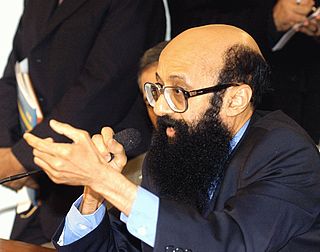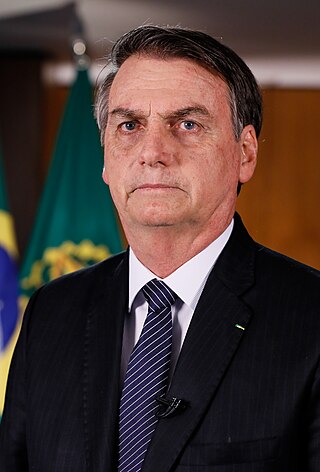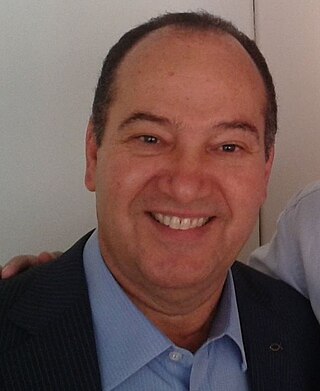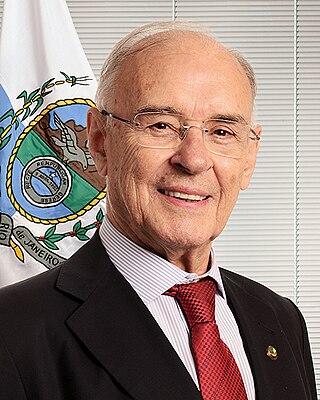
Enéas Ferreira Carneiro was a Brazilian polymath, cardiologist, physicist, mathematician, professor, writer, military serviceman and politician. He represented the state of São Paulo in the National Chamber of Deputies and ran for presidency three times. He was founder and leader of the nationalist and conservative Party of the Reconstruction of the National Order (PRONA), which was usually seen as being far-right.
The Social Christian Party was a Christian-conservative political party in Brazil.

Lesbian, gay, bisexual, and transgender (LGBT) rights in Brazil rank among the highest in the world. Same-sex couples in Brazil have enjoyed the same rights guaranteed to heterosexual ones since 16 May 2013, including marriage and adoption. On June 13, 2019, the Brazilian Supreme Court ruled that discrimination on the basis of sexual orientation and gender identity is a crime akin to racism.

Clodovil Hernandes was a Brazilian fashion designer, television presenter, and politician. Hernandes made his debut of fame as a fashion stylist during the 60s and 70s, after which he was invited to work on television. His dedication and fame on television lasted for over 40 years and various television stations. In his political career, Hernandes was known for statements deemed inappropriate, often directed at other famous personalities. Among other controversies, he was accused of racism and antisemitism. Hernandes was the first openly gay congressman in Brazil.

The Liberal Party is a far-right political party in Brazil. From its foundation in 2006 until 2019, it was called the Party of the Republic.

Podemos, previously known as the National Labour Party is a centre-right Brazilian political party. Historically labourist and Janist, since 2016 the party shifted its focus to support anti-corruption policies and direct democracy.

The Brazilian Labour Party was a political party in Brazil registered in 1981 by Ivete Vargas, niece of President Getúlio Vargas. It claimed the legacy of the historical PTB, although many historians reject this because the early version of PTB was a center-left party with wide support in the working class. It was the seventh largest political party in Brazil with more than a million affiliated as of 2022.
LGBT conservatism refers to LGBT individuals with conservative political views. It is an umbrella term used for what is bifurcated into two specific sub-categories, each with its own term and meaning. The first sub-categorical term, Pre-Stonewall LGBT Conservatism, refers to LGBT individuals embracing and promoting the ideology of a traditional conservatism in either a general or specifically-LGBT social context or environment. The second sub-categorical term, Post-Stonewall LGBT Conservatism, refers to self-affirming LGBT persons with fiscally, culturally, and politically conservative views. These post-Stonewall conservatives' social views, though generally conservative too, at the same time reflect a self-determination-stemmed and more recent socio-historical "gay-affirmation" on issues like marriage equality for same-sex couples, gay family recognition, civic equality generally for LGBT people in society, and also a positive role for (gay-affirming) religion in LGBT life, though there is not complete unanimity of opinion among them on all issues, especially those regarding the dynamics and politics of the closet and "identity management," and various legal and political issues The first term can include LGBT people who are opposed to same-sex marriage or other LGBTQ rights while the second term, contrastingly, usually refers to self-affirming gay people who unequivocally favor marriage as a legal institution for both heterosexuals and gays and who simultaneously prefer economic and political conservatism more generally. The number of self-affirming LGBT advocates for conservative ideas and policies became more apparent only after the advent of the modern LGBT civil rights movement in the 1970s even as many gay conservatives, labelled as "self-hating" at the time, did remain closeted in areas where anti-gay socially conservative politicians then led the most organized opposition to LGBT rights. The Realpolitik and ideology situations for LGBT conservatives today vary by their own self-definition, and each country's sociopolitical, cultural, and legal LGBT rights landscape.

Jair Messias Bolsonaro is a Brazilian politician and retired military officer who served as the 38th president of Brazil from 2019 to 2022. He previously served in the Brazil Chamber of Deputies from 1991 to 2018.

Everaldo Dias Pereira, better known as Pastor Everaldo, is a Brazilian pastor, businessman and politician affiliated with Podemos. He is a pastor in the Assembly of God church and has been the national president of the Social Christian Party (PSC) until its merger with Podemos in 2023. He was the PSC's candidate for President of Brazil in the 2014 election, in which he placed fifth, with 0.75 percent of the total votes.

David Michael dos Santos Miranda was a Brazilian politician. He was a Federal Congressman representing the state of Rio de Janeiro, serving from 2019 until 2023, and was affiliated with the Democratic Labour Party (PDT), after switching parties from the Socialism and Liberty Party (PSOL) in 2022. Prior to that, he was a City Councilman representing the city of Rio de Janeiro. Miranda also played a key role in Edward Snowden's global surveillance leaks.

Eduardo Nantes Bolsonaro is a Brazilian politician, lawyer and federal police officer. He is the third child of Jair Bolsonaro, the 38th president of Brazil.

Gustavo Bebianno Rocha was a Brazilian lawyer and advisor to President Jair Bolsonaro (PSL). Bebianno became Acting Chairman of the Social Liberal Party in March 2018 after Luciano Bivar registered to run for federal deputy in the 2018 elections.

Carla Zambelli Salgado de Oliveira is a Brazilian far-right activist and politician. Founder of the movement On the Streets, Zambelli gained notoriety through her activism in favor of the impeachment of the ex-president Dilma Rousseff. In the elections of 2018, she was elected federal deputy for São Paulo, by the Social Liberal Party (PSL).

Arolde de Oliveira was a Brazilian soldier, economist and politician. Although born in Rio Grande do Sul, he spent his political career representing Rio de Janeiro, having served as federal deputy for nine consecutive terms from 1986 to 2019 and federal senator from 2019 until he died of COVID-19 in October 2020.

Sâmia de Souza Bomfim is a Brazilian politician. She has spent her political career representing São Paulo, having served as federal deputy representative since 2019.

Talíria Petrone Soares is a Brazilian politician. She has spent her political career representing Rio de Janeiro, having served as federal deputy representative since 2019.

General elections were held in Brazil on 2 October 2022 to elect the president, vice president, the National Congress, the governors, vice governors, and legislative assemblies of all federative units, and the district council of Fernando de Noronha. As no candidate for president—or for governor in some states—received more than half of the valid votes in the first round, a runoff election for these offices was held on 30 October. Luiz Inácio Lula da Silva received the majority of the votes in the second round and became president-elect of Brazil.

The 2021 Brazilian protests were popular demonstrations that took place in different regions of Brazil in the context of the COVID-19 pandemic. Protests both supporting and opposing the government happened.
General elections will be held in Brazil on 4 October 2026 to elect the president, vice president, members of the National Congress, the governors, vice governors, and legislative assemblies of all federative units, and the district council of Fernando de Noronha. If no candidate for president—or for governor in some states—received more than half of the valid votes in the first round, a runoff election for these offices will be held on 31 October.

















